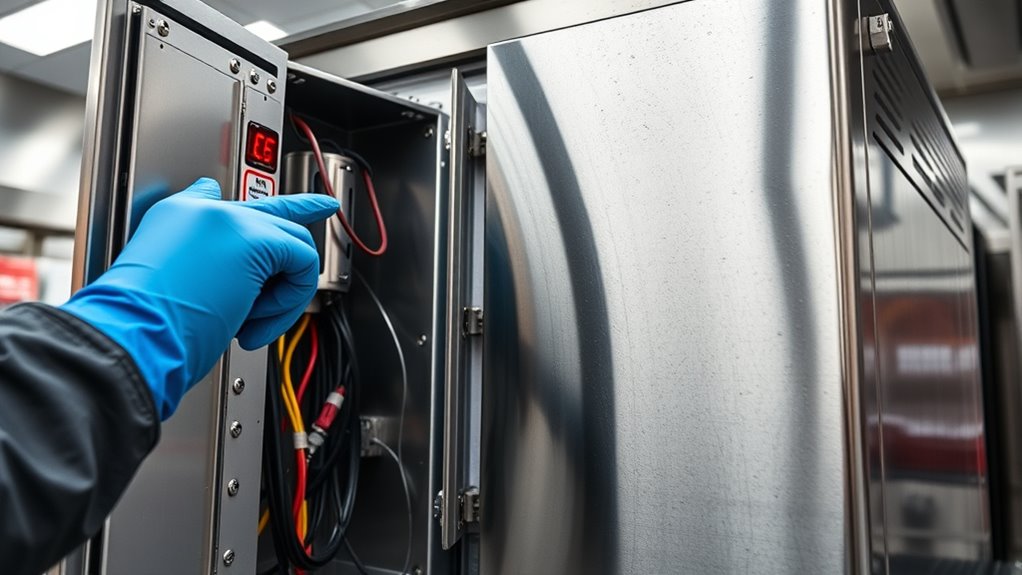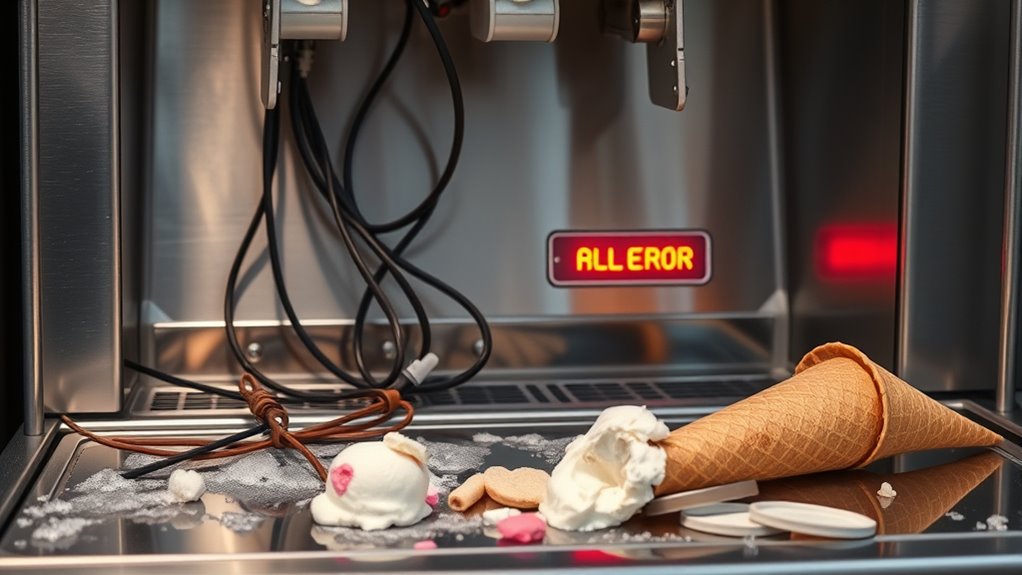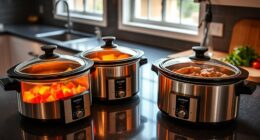If your commercial ice cream machine breaks down, start by checking the power supply—ensure it’s plugged in, the outlet works, and the circuit breaker hasn’t tripped. Clean the mix hopper, dasher, and freezing cylinder thoroughly to remove residue that can clog the system. Verify the temperature and airflow, listen for unusual noises, and check the control panel for error codes. Follow these steps first, and you’ll be surprised at what you can troubleshoot on your own.
Key Takeaways
- Check if the machine is properly plugged in and the outlet is functioning.
- Inspect the power cord for damage and reset the circuit breaker if tripped.
- Verify the temperature settings are correct and adjust the thermostat to around 0°F (-18°C).
- Ensure the control panel shows no error codes or warning lights; reset if necessary.
- Clean the mix hopper, dasher, and freezing cylinder thoroughly to remove residue buildup.

Commercial ice cream machines are indispensable for maintaining smooth operations, but they can sometimes encounter issues that disrupt service. When your machine breaks down, it can cause frustration and lost revenue. Before calling in a technician, there are simple troubleshooting steps you should try first. Often, the problem stems from common causes that you can address quickly, saving you time and money.
One of the first things to check is the machine’s power supply. Make sure it’s plugged in properly and that the outlet is functioning. Sometimes, the issue isn’t with the machine itself but with the power source. If your machine uses a circuit breaker, verify that it hasn’t tripped. Reset it if necessary. Also, inspect the power cord for any damage. If you’re using dairy alternatives such as almond milk or coconut milk, ensure they’re stored correctly and haven’t expired, as spoiled ingredients can clog the system or cause inconsistent freezing.
Next, review the machine’s cleanliness and maintenance. Regular maintenance tips are indispensable for preventing breakdowns. Clean the mix hopper, dasher, and freezing cylinder thoroughly, removing any buildup or residue that can interfere with the machine’s operation. Dairy alternatives tend to be more prone to causing residue build-up due to their different compositions compared to traditional dairy, so pay extra attention here. Use the recommended cleaning solutions and follow the manufacturer’s instructions to avoid damaging sensitive parts. Always make sure that all parts are thoroughly dried before reassembling. Proper cleaning procedures can significantly reduce the likelihood of malfunction.
Temperature issues are another common culprit. Check your freezer temperature—if it’s too warm, the ice cream won’t freeze properly, leading to inconsistent texture or complete failure. Adjust the thermostat to the recommended setting, usually around 0°F (-18°C). If your machine has a compressor, listen for unusual noises that might indicate a malfunction. Also, verify that the air vents aren’t blocked, as proper airflow is indispensable for cooling. Proper machine calibration can help ensure consistent performance and prevent issues related to incorrect settings. Additionally, maintaining a consistent ambient environment around the machine helps preserve optimal operation.
If your machine has an electronic control panel, look for error codes or warning lights. Refer to the user manual to understand what these signals mean and follow the suggested troubleshooting steps. Sometimes, simply resetting the machine by turning it off and unplugging it for a few minutes can resolve minor electronic glitches. Additionally, ensure that the refrigerant levels are adequate, as low refrigerant can cause cooling issues and impact the freezing process. Regular system checks are recommended to catch potential problems early and keep the machine running smoothly.
Frequently Asked Questions
How Often Should I Perform Maintenance on My Ice Cream Machine?
You should perform maintenance on your ice cream machine regularly to keep it running smoothly. This includes daily cleaning and weekly component inspection to prevent buildup and identify any issues early. Consistent care helps maintain quality and extends the machine’s lifespan. Don’t forget to follow the manufacturer’s guidelines for specific maintenance intervals, ensuring your machine stays in top condition and avoids unexpected breakdowns.
Can I Fix Certain Issues Myself, or Should I Always Call a Technician?
Did you know that 60% of small appliance repairs are successful with DIY efforts? When your ice cream machine has issues, you might be tempted to fix it yourself. However, while some simple problems like cleaning or replacing filters are manageable, complex repairs often need expert assistance to prevent damage. Always assess your skill level first; for complicated issues, calling a technician guarantees safety and proper repair.
What Safety Precautions Should I Follow When Troubleshooting the Machine?
When troubleshooting your ice cream machine, prioritize electrical safety by unplugging it before inspecting. Always wear proper protective gear like gloves and safety glasses to prevent injuries. Keep your workspace dry to avoid electrical shocks, and avoid touching internal parts with wet hands. If you’re unsure or uncomfortable, don’t hesitate to call a professional. Following these safety precautions helps prevent accidents and ensures you work securely on your machine.
Are There Common Parts That Tend to Fail More Frequently?
You should know that some parts tend to fail more often, like gaskets needing replacement and compressor issues. Gaskets can crack or wear out over time, causing leaks or cooling problems. Compressor issues are common due to overheating or electrical faults. Regularly inspecting these parts and replacing gaskets when worn can prevent major breakdowns. Staying attentive to these vulnerable components helps keep your machine running smoothly and reduces costly repairs.
How Can I Prevent Future Breakdowns of My Commercial Ice Cream Machine?
You can prevent future breakdowns by maintaining a routine of regular cleaning to keep parts free of residue and buildup. Additionally, guarantee proper storage when the machine isn’t in use, protecting it from dust and humidity. Regular inspections help catch issues early, and following manufacturer guidelines for maintenance extends your machine’s lifespan. With consistent care, you’ll reduce the chances of unexpected failures and keep your ice cream machine running smoothly.
Conclusion
So, next time your commercial ice cream machine acts up, don’t panic—just give these tips a shot. Ironically, sometimes a simple reset or cleaning does the trick, saving you from costly repairs or replacements. Who knew the fix might be as easy as hitting pause? So, before calling in help or throwing in the towel, try these tricks—you might just freeze out the problem without breaking the bank!









